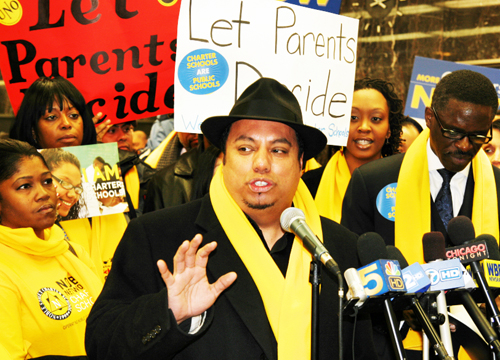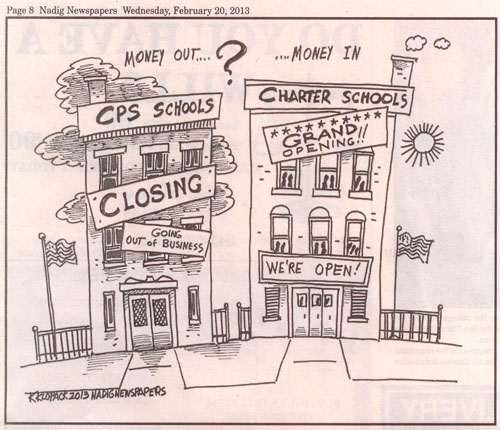CTU people challenge 'reckless' extension of UNO charter schools at charter hearing
Representatives of the Chicago Teachers Union and community activists took their message of prudence to the hearings at the Chicago Board of Education on February 21, 2013, and asked that the Board demand more accountability from the UNO charter schools before extending the UNO charters for another five years. The Board is expected to vote on the massive expansion of charter schools at its February 27 meeting, while simultaneously continuing to claim that the city's real public schools are part of a problem of "undeutilization."
 UNO chieftain Juan Rangel at a recent charter school event. Substance photo by David Vance.Here is the complete statement from the union's people. The time limits on public participation from the Board cut most of it off:
UNO chieftain Juan Rangel at a recent charter school event. Substance photo by David Vance.Here is the complete statement from the union's people. The time limits on public participation from the Board cut most of it off:
We wish to raise serious concerns about the academic and managerial practices at UNO Charter Schools. We urge the Board to look into those practices recently revealed and to place conditions on the renewal of UNO’s charter agreement, to safeguard the best interests of students, parents and teachers.
The Illinois Charter School Law was enacted with the stated aims of “improv[ing] pupil learning by creating schools with high, rigorous standards for pupil performance.” The law confers upon charter schools significant freedoms in experimenting with methods to achieve higher performance. When those schools do not meet their performance goals, the law requires that the schools be held “accountable for meeting rigorous school content standards.”
A review of the charter schools run by UNO shows that they have failed to make progress toward their academic goals. Additionally, UNO’s questionable dealings have violated their charter agreement. This is an agreement they have with all public school students, their communities, the City of Chicago and the State of Illinois.
We urge the Board to conditionally renew UNO’s charter for only one year with benchmarks for improvement and the stipulation that no material modifications for additional expansion can be made during that time. At a time when resources for public education are scarce, when every penny should be going to students, a renewal without serious conditions for UNO would be unconscionable. UNO’s management has failed to deliver sufficient academic success to justify a full renewal and continued expansion.
 The decline in community newspapers in Chicago has been offset in some communities by family-owned newspapers like the "Northwest Side News" (the "Nadig papers") in Portage Park and Jefferson Park and Substance. Although The New York Times and the Wall Street Journal are "family owned," it is different. The above cartoon from the Nadig papers shows how a local independence can get much news covered. The craven subordination of the Chicago Defender to the corporate ruling class of Chicago created a great void in the city, and other destructions have had a similar result. But it is not clear, in 2013, that such a decline has to continue. As a network, UNO has failed to make adequate yearly progress (AYP) since 2007. UNO Charter Schools have lagged behind the state average on both the ISAT and PSAE for every year that we have data for. At a district level, UNO is basically in a test-score dead heat with other schools serving similar populations of students. UNO schools perform better than the district average, but perform worse than magnet schools that admit students via lottery, like UNO.
The decline in community newspapers in Chicago has been offset in some communities by family-owned newspapers like the "Northwest Side News" (the "Nadig papers") in Portage Park and Jefferson Park and Substance. Although The New York Times and the Wall Street Journal are "family owned," it is different. The above cartoon from the Nadig papers shows how a local independence can get much news covered. The craven subordination of the Chicago Defender to the corporate ruling class of Chicago created a great void in the city, and other destructions have had a similar result. But it is not clear, in 2013, that such a decline has to continue. As a network, UNO has failed to make adequate yearly progress (AYP) since 2007. UNO Charter Schools have lagged behind the state average on both the ISAT and PSAE for every year that we have data for. At a district level, UNO is basically in a test-score dead heat with other schools serving similar populations of students. UNO schools perform better than the district average, but perform worse than magnet schools that admit students via lottery, like UNO.
This lack of academic achievement should not be surprising, given some of the clear and significant negative factors in the educational policies set by UNO management. For example:
A. Lack of support for English Language Learners: UNO has no dual language programs and provides few supports for Limited English Proficiency students. Instead, UNO uses English-immersion techniques, which research suggests has limited benefits after early grade school.
B. Inability to serve Special Education Students: 8.4% of UNO students have Individual Education Plans (IEPs) compared to 13.2% of CPS as a whole. Furthermore, UNO tends not to enroll students with the most severe disabilities.
C. Large class sizes: UNO has 32 students to a class, almost 15% larger than the CPS average of 28. Nationwide best practices suggest class sizes of no larger than 20-22 in early grades, which means that UNO’s class sizes are 50% larger than recommended.
D. Massive teacher turnover: Only 2 of 9 UNO campuses had better than 50% teacher retention between 2011 and 2013. The two-year retention rate at Tamayo was 14%, at Marquez was 20% retention, and at Paz was 22%. Research suggests that rapid teacher turnover destabilizes schools, limits staff-student collaboration, hinders the development of professional learning communities, prevents the development of institutional knowledge, and destroys relationships between teachers and families.
Paragraph 13 of UNO’s charter agreement states that “The Board may revoke this Agreement and the charter of the Charter School…if the board clearly demonstrates that the Charter School… [f]ailed to meet or make reasonable progress toward achievement.”
UNO’s academic program has failed to insure achievement for all students and must be revisited. We urge the board to conditionally renew UNO’s charter school, for a term of one year, with further condition that UNO shall not expand their network to include any new charter schools. The conditions should include distinct benchmarks to bring performance up the high standards promised by the charter movement. A conditional renewal will allow the Board to reevaluate UNO’s academic performance, and take necessary corrective actions if progress is not made toward academic achievement.
UNO’s management has awarded contracts to relatives of board members, a failure to adhere to generally accepted standards of fiscal management.
An investigation by the Sun Times showed that UNO paid approximately $11.3 million of a $98 million state grant to firms related to UNO board member Miguel d’Escoto. Alderman Danny Solis, a founder of UNO called the deal “improper,” and Miguel d’Escoto has since resigned. UNO is currently being investigated by the DCEO for failing to report the conflict of interest in awarding this contract. UNO has failed to adhere to a basic and generally accepted standard of fiscal management: maintaining adherence to a conflict of interest and private inurement policies. Non-profit companies are required to create and adhere to conflict of interest policies, as are Chicago Public Schools. Paragraph 13 of UNO’s charter agreement states that this Board may revoke UNO’s charter agreement if they “Failed to meet generally accepted standards of fiscal management.” Again, we call for this Board to only approve UNO’s charter renewal application on a one-year, conditional basis. We request that the term of this renewal be no more than one year, so that UNO can demonstrate swift progress toward compliance. Further, given the questions of UNO’s noncompliance with both state law and their charter agreement, we request that UNO not be permitted to make any material modifications to its charter agreement during this period. UNO’s unsustainable debt load is another failure of fiscal management and more seriously puts its ability to adequately serve its students at risk.
Parents United for Responsible Education recently petitioned the Illinois Executive Inspector General to investigate UNO’s irresponsible borrowing practices. These groups calculated UNO’s debt load at $67.8 million dollars, or approximately $12,500 per student. UNO’s unsustainably high levels of debt call their fiscal stewardship into question.
UNO failed to control costs on their construction project, wasting $18 million in taxpayer funds.
UNO submitted a $35 million budget to the Illinois Department of Commerce & Economic Opportunity (DCEO) for the construction and acquisition of two schools (the Galewood and North Natchez facilities) to begin on November 1, 2011. In December 2012, the DCEO approved an additional $18 million grant amendment for the same project. According to the grant amendment, the additional funds were needed to cover cost overruns. A chart of the cost overruns shows that UNO has not been a careful steward of taxpayer dollars, running overages in access of 100% on several cost categories:
Cost Cat. Description Prior budget Modification New budget Variance
1205 DESIGN/ENGINEERING 1,500,000.00 757,965.00 2,257,965.00 +51%
1209 BUILDING/LAND PURCHASE 6,600,000.00 -4,030,000.00 2,570,000.00 -61%
1215 WIRING/ELECTRICAL 4,000,000.00 1,074,915.00 5,074,915.00 +27%
1217 EQUIPMENT/MATERIAL/LABOR 11,450,000.00 13,431,381.00 24,881,381.00 +117%
1219 PAVING/CONCRETE/MASONRY 1,900,000.00 516,133.00 2,416,133.00 +27%
1221 CONSTRUCTION MGMT & OVERSIGHT 900,000.00 1,753,440.00 2,653,440.00 +195%
1223 MECHANICAL SYSTEMS 3,000,000.00 1,998,500.00 4,998,500.00 +67%
1225 EXCAVATION/SITE PREP/DEMO 1,500,000.00 554,720.00 2,054,720.00 +37%
1229 PLUMBING 900,000.00 351,500.00 1,251,500.00 +39%
1233 OTHER CONSTRUCTION EXPENSES 1,750,000.00 -470,607.00 1,279,393.00 -27%
1235 CONTINGENCY 1,500,000.00 2,062,053.00 3,562,053.00 +137%
Additionally, note that the “construction management and oversight” cost category had an overrun of 195%. According to the Sun Times investigation, d’Escoto Inc., the company run by the brother of a former UNO board member, managed construction and oversight of these projects. In essence, this taxpayer-funded overage benefitted UNO insiders. This mismanagement of taxpayer dollars demonstrates UNO’s inability to adhere to basic precepts of fiscal management. Not only did they under-budget a project by more than 50%, UNO’s largest cost overrun directly benefitted a contractor related to an UNO board member.
The results of several investigations into UNO’s business practices have yet to be released. These investigations may uncover violations of state or federal law, itself a violation of UNO’s charter agreement.
UNO’s own internal review of apparent impropriety in their contracting is ongoing. Findings of that review, as well as concurrent reviews by the DCEO and Inspector General may conclude that UNO has violated state or federal law in the awarding of contracts to relatives of UNO board members.
UNO’s possible violations of its current charter agreement, and possibly of state and federal laws, could have severe impacts on students, teachers and neighborhoods. For this reason, caution on the part of the Board of Education and full accountability from UNO are imperative. A five-year renewal of their agreement would be reckless at this point in time. We urge that the Board instead only conditionally renew UNO’s charter agreement for one year, with benchmarks for compliance and improvement, and stipulations halting further expansion. At the very least, we ask that the Board refrain from renewing UNO’s charter until the completion of UNO’s ongoing internal review and of any ongoing investigations by public officials such as the Illinios Executive Inspector General. The CPS New Schools and Programs office should have the ability to revisit the renewal application in light of any findings by any of these investigations.


By: William Michelson
Juan Rangel's Lies
How much longer are people going to listen to this little sleazy hoodlum before they realize he offers nothing?